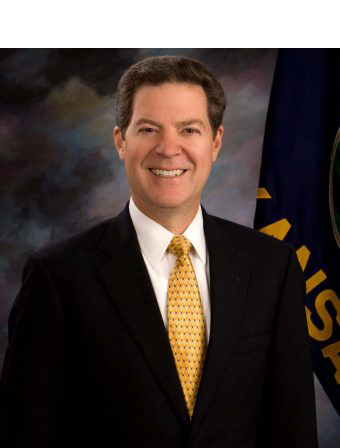By the writers of Insight Kansas
Sam Brownback pushed one of the paradoxes of American politics to its limit. It is a truism that Americans espouse a narrative of generally anti-government views and conservative rhetoric. Even the label “conservative” polls far, far better than does “liberal” or “progressive,” because it is how we like to see ourselves—especially around here.
Yet idealistic conservative reformers never fail to snag on the horns of reality—voters like the sound of lower taxes and smaller government, but not when it comes to our own kids’ schools, the roads that carry us to work, aid to our cash-strapped rural hospitals, and all the other basic services that make up what state government actually does. These are hardly waste, fraud, or abuse, they require tax dollars, and they can be expensive. Brownback tried through sheer force of will to align reality with the small-government rhetoric.
In the end, he failed.
Michael Smith (Dr. Michael Smith is a professor of political science at Emporia State University)
Sam Brownback’s governorship essentially ended when Kansas legislators rescinded his tax experiment through a bipartisan veto override. His departure puts a period at the end of a sentence already written. Brownback’s 2012 decision to sign a dramatic tax cut bill almost solely defined his governorship. The tax cuts threw Kansas into fiscal disarray and threatened public education and good highways, things that many Kansans hold dear.
Constant budget troubles required all of the state’s political energy to be focused on crisis management rather than putting Kansas in a strong position for the future. Kansans finally had enough, changed the makeup of the Legislature, and demanded financial stability and a fairer tax code. Under Brownback, a tax experiment rose and fell.
With his exit, the work of repairing the damage can begin.
Duane Goossen (Duane Goossen served as Director of the Budget for three Kansas Governors)
Sam Brownback campaigned for governor in 2010 with a roadmap that addressed mainstream issues, such as economic progress, educational improvement, and childhood poverty. But once elected, he quickly showed that he would govern in alignment with a far-right faction of the Republican Party and its associated interests.
Governor Brownback sought to reverse long-standing state policy on taxes, school finance, and Supreme Court appointments, among other issues, and for the most his radical vision for Kansas fell short.
Brownback will be remembered for his reckless tax experiment. His fanatical drive to eliminate the state income tax produced unbalanced budgets, a depleted state treasury, unfair taxes, record debt, credit downgrades, and lagging growth. In the end a bipartisan coalition—a majority of Republican state lawmakers, along with Democrats—overrode the governor’s veto and ended his experiment.
The Brownback tax experiment now serves as a cautionary message to governors and lawmakers throughout the country.
Kansas voters gave Brownback a landslide margin in 2010 but never endorsed his radical model of red-state governance. The governor’s approval ratings steadily declined to the lowest in nation. In 2016, voters rebuked the governor on taxes, school finance, and Supreme Court appointments and signaled the end of his governorship.
H. Edward Flentje (Dr. Ed Flentje is a professor emeritus of public policy at Wichita State University and worked in the administration of Kansas Governor Mike Hayden)
Sam Brownback was a man of faith lost in a world of pragmatic skepticism. His attempt to bring his deep belief in minimalist government with the smallest financial cost and the power of unfettered, laissez-faire private sector economics ran aground on Kansas realities. He had his true believers. Even now they are prepared to accept the notion that government steals every penny it extorts, wastes it despite universal objection from the public, and never accomplishes anything as well as the private sector would do, if given the chance. The trouble for Brownback was that those true believers did not grow in faith and numbers. Reality overwhelmed prophecy.
As Mrs. Brownback was caught saying to her husband the governor, “Are they booing us?”
Mark Peterson (Dr. Mark Peterson is a professor of political science at Washburn University)
Sam Brownback, by some reckoning the most popular electoral politician in Kansas history, has ended his political career by simply drifting away. Honestly, save for his veto pen, he has not proven a major force in Kansas politics and policy-making since his narrow reelection victory in 2014. Even his signature tax bill, enacted in 2012, resulted less from his careful plans and more from the awkward passage of a bill that he didn’t initially endorse. His time in the Senate produced little of consequence, compared to such stalwarts as Bob Dole, Nancy Kassebaum, and Frank Carlson.
In the end, Sam Brownback was remarkably disengaged, especially in the last few years, as his tax policies turned to dust. We’re left with an empty smile and the memories of a sweater vest.
Burdett Loomis (Dr. Burdett Loomis is a professor of political science and the University of Kansas and worked in the administration of Kansas Governor Kathleen Sebelius)
